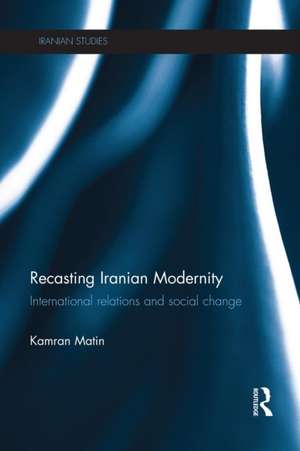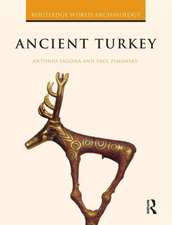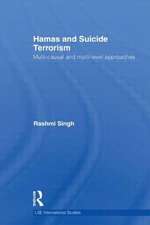Recasting Iranian Modernity: International Relations and Social Change: Iranian Studies
Autor Kamran Matinen Limba Engleză Paperback – 23 iul 2015
This hitherto under-theorized international dimension is, the book argues, manifest in combined patterns of development, which incorporate both foreign and native forms. It is the tension-prone and unstable nature of these hybrid developmental patterns that mark Iranian modernity, and fuelled the socio-political dynamics of the 1979 revolution and the rise of political Islam.
Challenging solely comparative approaches to the Iranian Revolution that explain it away as either a deviation from, or a reaction to, modernity on the grounds of its religious form, this book will be valuable to those interested in an alternative theoretical approach to the Iranian Revolution, modern Iran and political Islam, working in the fields of International Relations, Middle East and Islamic Studies, History, Political Science, Political Sociology, Postcolonialism, and Comparative Politics.
| Toate formatele și edițiile | Preț | Express |
|---|---|---|
| Paperback (1) | 442.88 lei 6-8 săpt. | |
| Taylor & Francis – 23 iul 2015 | 442.88 lei 6-8 săpt. | |
| Hardback (1) | 1057.75 lei 6-8 săpt. | |
| Taylor & Francis – 29 oct 2013 | 1057.75 lei 6-8 săpt. |
Din seria Iranian Studies
-
 Preț: 154.26 lei
Preț: 154.26 lei - 18%
 Preț: 1054.58 lei
Preț: 1054.58 lei - 18%
 Preț: 1068.18 lei
Preț: 1068.18 lei - 18%
 Preț: 997.90 lei
Preț: 997.90 lei - 18%
 Preț: 1108.37 lei
Preț: 1108.37 lei - 28%
 Preț: 823.63 lei
Preț: 823.63 lei -
 Preț: 440.77 lei
Preț: 440.77 lei - 25%
 Preț: 823.99 lei
Preț: 823.99 lei -
 Preț: 389.38 lei
Preț: 389.38 lei - 18%
 Preț: 1110.77 lei
Preț: 1110.77 lei -
 Preț: 478.86 lei
Preț: 478.86 lei - 18%
 Preț: 1055.51 lei
Preț: 1055.51 lei - 14%
 Preț: 299.52 lei
Preț: 299.52 lei - 18%
 Preț: 1059.84 lei
Preț: 1059.84 lei - 26%
 Preț: 848.57 lei
Preț: 848.57 lei - 30%
 Preț: 770.09 lei
Preț: 770.09 lei -
 Preț: 341.57 lei
Preț: 341.57 lei - 18%
 Preț: 1163.51 lei
Preț: 1163.51 lei - 26%
 Preț: 652.04 lei
Preț: 652.04 lei -
 Preț: 437.13 lei
Preț: 437.13 lei -
 Preț: 436.14 lei
Preț: 436.14 lei - 18%
 Preț: 1168.76 lei
Preț: 1168.76 lei - 25%
 Preț: 570.60 lei
Preț: 570.60 lei -
 Preț: 430.94 lei
Preț: 430.94 lei - 18%
 Preț: 1114.70 lei
Preț: 1114.70 lei - 26%
 Preț: 822.01 lei
Preț: 822.01 lei - 18%
 Preț: 1000.27 lei
Preț: 1000.27 lei - 18%
 Preț: 1060.52 lei
Preț: 1060.52 lei -
 Preț: 409.31 lei
Preț: 409.31 lei - 18%
 Preț: 1054.71 lei
Preț: 1054.71 lei - 22%
 Preț: 328.20 lei
Preț: 328.20 lei - 18%
 Preț: 1055.51 lei
Preț: 1055.51 lei - 18%
 Preț: 1002.63 lei
Preț: 1002.63 lei - 31%
 Preț: 683.99 lei
Preț: 683.99 lei - 18%
 Preț: 1061.06 lei
Preț: 1061.06 lei - 18%
 Preț: 1118.65 lei
Preț: 1118.65 lei - 18%
 Preț: 1054.75 lei
Preț: 1054.75 lei - 18%
 Preț: 1056.95 lei
Preț: 1056.95 lei
Preț: 442.88 lei
Nou
Puncte Express: 664
Preț estimativ în valută:
84.75€ • 90.62$ • 70.66£
84.75€ • 90.62$ • 70.66£
Carte tipărită la comandă
Livrare economică 17 aprilie-01 mai
Preluare comenzi: 021 569.72.76
Specificații
ISBN-13: 9781138952973
ISBN-10: 1138952974
Pagini: 222
Dimensiuni: 156 x 234 mm
Greutate: 0.3 kg
Ediția:1
Editura: Taylor & Francis
Colecția Routledge
Seria Iranian Studies
Locul publicării:Oxford, United Kingdom
ISBN-10: 1138952974
Pagini: 222
Dimensiuni: 156 x 234 mm
Greutate: 0.3 kg
Ediția:1
Editura: Taylor & Francis
Colecția Routledge
Seria Iranian Studies
Locul publicării:Oxford, United Kingdom
Public țintă
Postgraduate and UndergraduateCuprins
1. Introduction: Supplanting Eruocentrism 2. The Nomadic-Sedentary Synthesis: Amalgamated State-formations, 1500-1720 3. The Revolution of Backwardness: the Constitutional Revolution 1906-1911 4. Nationless Nationalisms: Reza Shah's Reforms, Mosaddeq's Revolt, 1921-1953 5. The Marriage of the Cold War and Oil: The Birth of the Citizen-Subject and the Revolution, 1961-1979 6. An Iranian Janus: the Making of Revolutionary Islam 7. Conclusion: Uneven and Combined Development and Historical Materialism
Notă biografică
Kamran Matin is Lecturer in International Relations at the University of Sussex.
Descriere
Critically deploying the idea of uneven and combined development this book provides a novel non-eurocentric account of Iran’s experience of modernity and revolution. Recasting Iranian Modernity presents the argument that eurocentrism can be decisively overcome through a social theory that has international relations at its ontological core. This will enable a conception of history in which there is an intrinsic international dimension to social change that prevents historical repetition.
This hitherto under-theorized international dimension is, the book argues, manifest in combined patterns of development, which incorporate both foreign and native forms. It is the tension-prone and unstable nature of these hybrid developmental patterns that mark Iranian modernity, and fuelled the socio-political dynamics of the 1979 revolution and the rise of political Islam.
Challenging solely comparative approaches to the Iranian Revolution that explain it away as either a deviation from, or a reaction to, modernity on the grounds of its religious form, this book will be valuable to those interested in an alternative theoretical approach to the Iranian Revolution, modern Iran and political Islam, working in the fields of International Relations, Middle East and Islamic Studies, History, Political Science, Political Sociology, Postcolonialism, and Comparative Politics.
This hitherto under-theorized international dimension is, the book argues, manifest in combined patterns of development, which incorporate both foreign and native forms. It is the tension-prone and unstable nature of these hybrid developmental patterns that mark Iranian modernity, and fuelled the socio-political dynamics of the 1979 revolution and the rise of political Islam.
Challenging solely comparative approaches to the Iranian Revolution that explain it away as either a deviation from, or a reaction to, modernity on the grounds of its religious form, this book will be valuable to those interested in an alternative theoretical approach to the Iranian Revolution, modern Iran and political Islam, working in the fields of International Relations, Middle East and Islamic Studies, History, Political Science, Political Sociology, Postcolonialism, and Comparative Politics.














